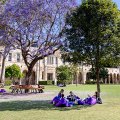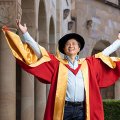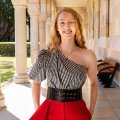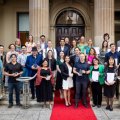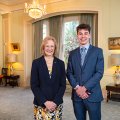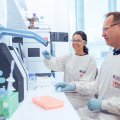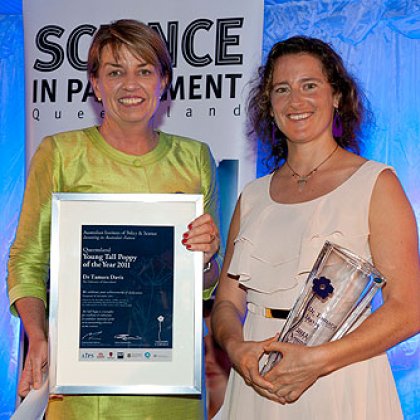
Three talented UQ scientists who share a passion to share their research with the wider community have been named winners at the 2011 Queensland Young Tall Poppy Science Awards.
Announced last week at the Premier’s Science and Innovation Reception at Parliament House in Brisbane, the awards recognise excellence in early career research and a passion and capacity to communicate science to the community.
UQ astrophysicist Tamara Davis received the top prize of $10,000 as the overall winner of the awards.
Other winners from UQ are Associate Professor Matthew Davis, also from the School of Mathematics and Physics, and Dr Siobhan Schabrun from UQ’s School of Health and Rehabilitation Sciences.
"I love trying to figure out how the universe works, and still have a sense of wonder when I look at the night sky," Dr Tamara Davis said.
“It is such a privilege to have a job that pays me to do what I would happily do in my spare time. ”
Dr Davis’s research includes using supernovae (exploding stars) to trace the expansion history of the universe. She has been an active participant in numerous science outreach programs, and has given many public talks, media interviews and also appeared on YouTube.
Associate Professor Matthew Davis’ work focuses on the physics of ultra-cold quantum gases which can provide insight into many aspects of nature from the unravelling of DNA to the birth of the universe.
Associate Professor Davis initiated a “Quantum Science” seminar series, has been involved in the Siemens Science Experience, and has given numerous science presentations to a wide range of audiences.
“I am very proud to have received this award. It will provide a great opportunity to get out into the community and to discuss some of the amazing things that are possible with quantum physics,” he said.
Dr Schabrun researches the processes that underpin brain “plasticity”, with a focus on the development of new therapies that aim to alleviate symptoms and improve function in common conditions such as stroke, chronic pain and incontinence.
She has been an active participant in many programs such as Scientists in Schools, Students in Free Enterprise (SIFE), and Youth Parliament, and also coordinates the Research Incubator Program aimed at inspiring and engaging undergraduate students.
The young scientists will give their time next year engaging with teachers, school students, parents and the broader community around Queensland and across Australia as part of the Tall Poppy Campaign run by the Australian Institute of Policy and Science.
Media: Aarti Kapoor (07 3346 9935, a.kapoor@uq.edu.au)

